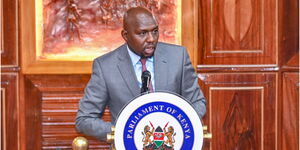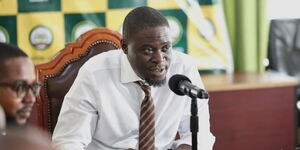In an application letter to the President of the World Bank, Kristalina Georgieva, Treasury Cabinet Secretary Henry Rotich on March 13, 2019, highlighted three promises in a bid to convince the World Bank to loan Kenya Ksh75 billion to fund the Big Four Agenda.
According to Nation, the World Bank board is set to decide on whether or not to approve the application, described as Inclusive Growth and Fiscal Management Development Policy Financing.
However, it faces opposition from some countries which have representation on the bank's board. The critics are raising doubts over Kenya's weak financial public management systems and challenges, such as the one the government faced trying to account for Eurobond proceeds.
In his letter, Rotich cited three recent measures the government has taken in its fight against corruption. The measures are arrests and prosecution of government officials and business people, lifestyle audits conducted on all public officers. The government is also ensuring that public servants comply with requirements to declare their wealth.
The budget support that the government has asked for is not tied to specific projects and open for use to finance political activities. The cash could be vulnerable to appropriation by the corrupt elite.
This is the first time in more than a decade, that Kenya has reached out to the World Bank for an urgent loan in the form of budget support.
Under former President Mwai Kibaki's regime, Kenya kept away from budget support credit opting for projects that World Bank would undertake itself.
According to the project document on the bank's website, the loan will enable the government to finance affordable housing; enhance farmers incomes and food security and allow the government to invest in key development programs.
Should the loan be approved, it will add to Kenya's growing debt burden.
Kenya's debt service-to-revenue ratio stands at 38 percent, up from 17 percent in 2012 and way above the global benchmark of 25 percent.
This means that, for every Ksh 100, Kenya is spending Ksh 38 for debt service, Ksh45 on salaries and wages (including pensions) and Ksh 40 on recurrent expenditure. The country, therefore, is spending Ksh123 for every Ksh100 it collects in revenue.
These calculations do not factor in development expenditure, meaning that the country is not only borrowing for development expenses but also to meet its recurrent expenditure.
A report by the Parliamentary Budget Office (PBO) showed that the Treasury was masking the true budget deficit by using a set of numbers that ignore adjustments.
The PBO also accused Treasury of surpassing the budget ceiling given by Parliament.
Meanwhile, plans to address environmental hitches facing the Lake Victoria Basin has faced a major setback following the World Bank's decision to withhold Sh1 billion for the third phase of Lake Victoria Environmental Management Programme (Lvemp).
Executive Secretary, Ali Matano revealed that there were negotiations ongoing with the World Bank to support the third phase of the entire program during the 2oth Sectoral Council of Ministers of the Lake Victoria Basin Commission (LVBC) on Friday.
“The first two phases of the project have contributed significantly to conservation efforts. World Bank has, however, put a pause on the third phase, but we have already held constructive talks with them,” Matano lamented.
The execution of the first two phases has enabled the management of the environmental body to purchase a water hyacinth collector that has proved very resourceful to their activities of reducing hyacinth coverage on the freshwater lake.
The commission is now seeking about Sh1 billion to fund the project meant to address pollution as well as fight water hyacinth weed, which continues to a headache to the entire initiative.












